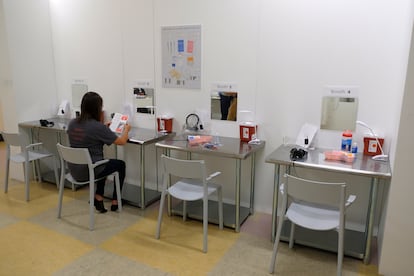California governor bans drug injection centers for overdose control
Gavin Newsom says no to the initiative, despite having expressed his support for the pilot program four years ago


Gavin Newsom’s presidential ambitions have crossed paths with one of America’s most progressive issues: experimentation with centers for controlled illegal drug use. On Monday, the Democratic California governor vetoed a law to allow the implementation of anti-addiction pilot projects in the cities of Los Angeles, San Francis and Oakland. “The unlimited number of safe injection sites that this bill would authorize – facilities which could exist well into the later part of this decade – could induce a world of unintended consequences,” said Newsom, one of the figures who aspires to take over for Joe Biden in the 2024 presidential race if the current president decides not to run for re-election.
The safe injection site law was the only bill Newsom vetoed in a package of 21 bills. California Democrats had drawn up a proposal that would allow local governments in the state’s most populous counties, with 40 million people, to open centers with clean needles, where health specialists could intervene in the case of an overdose. In 2021, the country registered its highest number of deaths from substance abuse to date, with more than 108,000 deaths. This epidemic has been fueled by fentanyl, a powerful synthetic opiate. In San Francisco alone, more than 1,600 people have died of overdoses since 2020, almost double the number of victims left by the coronavirus.
In a letter about his decision, Newsom recognized that these centers “[could] help improve the safety and health of our urban areas” if accompanied by a robust harm reduction plan. “These unintended consequences in cities like Los Angeles, San Francisco, and Oakland cannot be taken lightly. Worsening drug consumption challenges in these areas is not a risk we can take,” wrote the governor, who in 2018, when he began his run for office, said he was “very open” to such programs. That year, then-governor Jerry Brown vetoed a similar but less ambitious initiative.
Harm reduction centers already exist in the United States. As of November 2021, New York had two safe injection sites, which have helped prevent some 400 overdoses. The city’s mayor, Democrat Eric Adams, said last May that he is willing to go “further” and allow the privately funded centers to open their doors 24 hours a day. “This crisis does not wait and neither should we,” the politician wrote on Twitter.
Newsom, who continues to openly deny that he intends to run for the presidency of the United States, has said that he has instructed his administration to discuss “minimum standards and best practices” for overdose prevention with local governments. “I remain open to this discussion when those local officials come back to the Legislature with recommendations for a truly limited pilot program,” added the official. In 2004, Newsom became one of the first Democrats to openly support same-sex marriages despite being heavily criticized by fellow party members.
Political communication experts agree that approving the rule could have affected Newsom outside of California. There are signs that the governor is thinking on a national level. This year, he has paid for advertising in Florida and California, contrasting his progressive policies with those of his conservative counterparts.
Tim Miller, a longtime Republican strategist, told The San Francisco Chronicle that Ron DeSantis, the governor of Florida, makes Newsom look like “the pro-heroin governor.” DeSantis is one of the favorites to win the Republican candidacy if Donald Trump is prevented from running in 2024.
Newsom’s veto has disappointed California’s most liberal voters. But David Chiu, the city attorney for San Francisco, has said that the city’s government will allow the operation of non-profit anti-overdose centers. Two organizations, HealthRight360 and the AIDS Foundation, have said they are willing to launch pilot tests in the Bay, but are waiting on locations and financial support.
Tu suscripción se está usando en otro dispositivo
¿Quieres añadir otro usuario a tu suscripción?
Si continúas leyendo en este dispositivo, no se podrá leer en el otro.
FlechaTu suscripción se está usando en otro dispositivo y solo puedes acceder a EL PAÍS desde un dispositivo a la vez.
Si quieres compartir tu cuenta, cambia tu suscripción a la modalidad Premium, así podrás añadir otro usuario. Cada uno accederá con su propia cuenta de email, lo que os permitirá personalizar vuestra experiencia en EL PAÍS.
¿Tienes una suscripción de empresa? Accede aquí para contratar más cuentas.
En el caso de no saber quién está usando tu cuenta, te recomendamos cambiar tu contraseña aquí.
Si decides continuar compartiendo tu cuenta, este mensaje se mostrará en tu dispositivo y en el de la otra persona que está usando tu cuenta de forma indefinida, afectando a tu experiencia de lectura. Puedes consultar aquí los términos y condiciones de la suscripción digital.








































